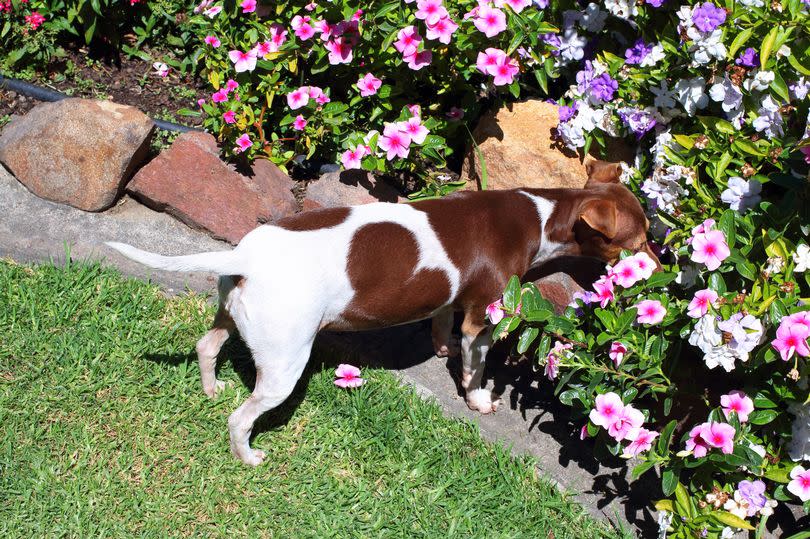18 summer plants that are toxic to dogs and poisoning symptoms to look out for

With the summer weather finally emerging, dog owners will be enjoying the sunshine with their four-legged friends, whether going out on long walks or playing in the garden.
Although it's a great time for you and your pooch to get out in the great outdoors, it's also the time that green spaces come into full bloom - and while they may look beautiful, several summer plants can pose a danger to your dog. Many common flowers that emerge at this time of year, including poppies, foxgloves and lilies, are toxic and can cause some serious side-effects if your pet eats them.
Ingesting these plants can cause unpleasant symptoms ranging from vomiting and diarrhoea to more severe complications like breathing difficulties and even heart failure, meaning eating them could sadly prove fatal to your dog. Here are some of the most common toxic plants to look out for, as well as the warning signs that could mean you need to call your vet immediately, according to the Blue Cross and Battersea.
Plants and flowers
Here are some of the most common plants and flowers you might see growing in your garden or in wild green spaces throughout May and the upcoming summer months that are toxic to dogs:
Azalea/rhododendrons (Rhododendron species)
Bluebells (Hyacinthoides species)
Common poppy (Papaver rhoeas)
Delphinium
Dumb cane (Diffenbachia species)
Foxgloves (Digitalis species)
Garden star-of-Bethlehem (Ornithogalum umbellatum)
Giant hogweed (Heracleum mantegazzianum)
Ivy (Hedera helix)
Laburnum (Laburnum anagyroides)
Lily
Onion and garlic plants (Allium species)
Oleander (Nerium oleander)
Potato plants (Solanum tuberosum)
Pieris plants (Pieris species)
Rowan (Sorbus aucuparia)
Rhubarb plants (Rheum species)
Wisteria
Not all parts of these plants will be toxic - for example, in some plants only the bulbs or berries will cause problems if your dog eats them. However, the animal charities advise that it's better to keep your dog away from the whole plant to be safe, as some species could prove particularly deadly.
Azaleas and rhododendrons, a family of shrub that blossom in spring contain a powerful neurotoxin which can disturb the body's cell membranes, meaning that eating these plants can cause vomiting and difficulty breathing which may prove fatal to your pet. Delphinium, meanwhile, is a tall flowering plant that can cause symptoms from constipation to heart failure - the alkaloids in this plant can block receptors in your dog's muscles and can also lead to death.
Elsewhere on the list, foxgloves are a flowering plant found in woodlands and gardens and can be fatal if consumed by dogs because all parts contain cardiac glycosides, which can cause severe heart problems when ingested. And the lily family of plants, which includes lily of the valley, calla lily and peace lily varieties, are all potentially toxic for dogs, with the most common symptoms are vomiting, diarrhoea, lack of appetite and drooling.
Oleanders are flowering plants that can grow into large trees/hedges, and the foliage contains cardiac glycosides which affect the heart - the bark is very toxic, and even a small amount of this plant can be fatal if eaten. Wisteria is a climbing vine with recognisable bunches of pink or purple flowers, and contains lectin and wisterin toxins which can be fatal if consumed.
Most of the toxic plants on the list will only cause mild symptoms, but some can be more serious, especially if your dog eats lots of them in a short time, which can easily happen as many do not cause side-effects straight away. Remember, this isn't a complete list, as there are plants that haven't yet been identified as toxic to dogs - if in doubt as to whether your dog has eaten something poisonous, it's always best to contact your vet straight away.
Symptoms of plant poisoning
According to the Blue Cross, the most common signs that your dog has eaten something toxic can include:
Drooling
Not eating
Low energy
Vomiting or diarrhoea – especially if bits of chewed up plants are in it
Drinking or weeing more
Rashes
Red skin
Mouth ulcers
Pale gums
Twitching or seizures
Collapse
If your dog eats a poisonous plant or is showing any of the above symptoms, it's important to call your vet immediately. Never try to make your dog sick, as attempting to do so can cause other complications which may harm them.

 Yahoo News
Yahoo News 
